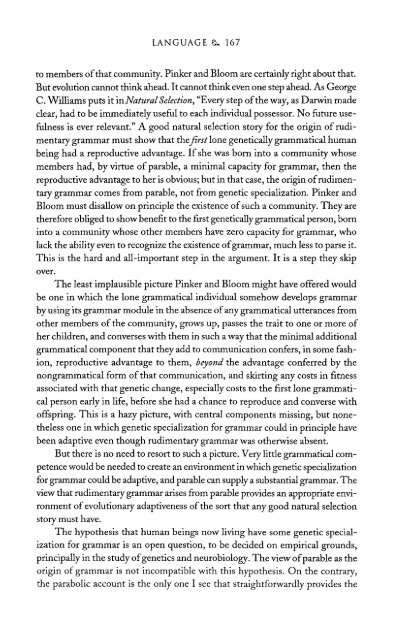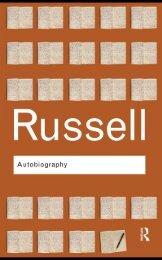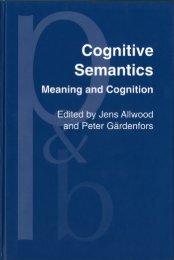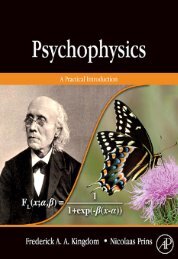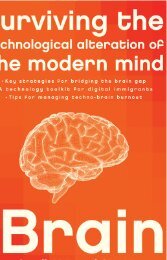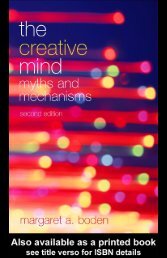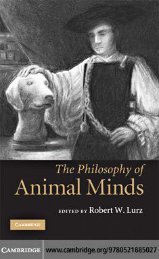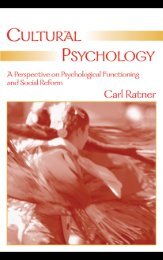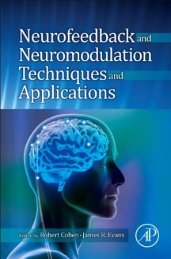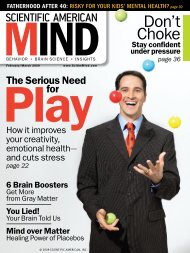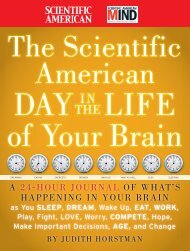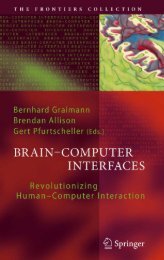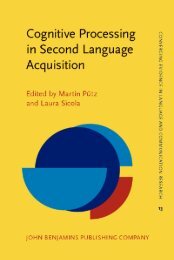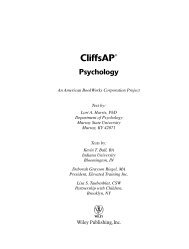The Literary Mind.pdf
The Literary Mind.pdf
The Literary Mind.pdf
You also want an ePaper? Increase the reach of your titles
YUMPU automatically turns print PDFs into web optimized ePapers that Google loves.
LANGUAGE 167<br />
to members of that community. Pinker and Bloom are certainly right about that.<br />
But evolution cannot think ahead. It cannot think even one step ahead. As George<br />
C. Williams puts it in Natural Selection, "Every step of the way, as Darwin made<br />
clear, had to be immediately useful to each individual possessor. No future usefulness<br />
is ever relevant." A good natural selection story for the origin of rudimentary<br />
grammar must show that the first lone genetically grammatical human<br />
being had a reproductive advantage. If she was born into a community whose<br />
members had, by virtue of parable, a minimal capacity for grammar, then the<br />
reproductive advantage to her is obvious; but in that case, the origin of rudimentary<br />
grammar comes from parable, not from genetic specialization. Pinker and<br />
Bloom must disallow on principle the existence of such a community. <strong>The</strong>y are<br />
therefore obliged to show benefit to the first genetically grammatical person, born<br />
into a community whose other members have zero capacity for grammar, who<br />
lack the ability even to recognize the existence of grammar, much less to parse it.<br />
This is the hard and all-important step in the argument. It is a step they skip<br />
over.<br />
<strong>The</strong> least implausible picture Pinker and Bloom might have offered would<br />
be one in which the lone grammatical individual somehow develops grammar<br />
by using its grammar module in the absence of any grammatical utterances from<br />
other members of the community, grows up, passes the trait to one or more of<br />
her children, and converses with them in such a way that the minimal additional<br />
grammatical component that they add to communication confers, in some fashion,<br />
reproductive advantage to them, beyond the advantage conferred by the<br />
nongrammatical form of that communication, and skirting any costs in fitness<br />
associated with that genetic change, especially costs to the first lone grammatical<br />
person early in life, before she had a chance to reproduce and converse with<br />
offspring. This is a hazy picture, with central components missing, but nonetheless<br />
one in which genetic specialization for grammar could in principle have<br />
been adaptive even though rudimentary grammar was otherwise absent.<br />
But there is no need to resort to such a picture. Very little grammatical competence<br />
would be needed to create an environment in which genetic specialization<br />
for grammar could be adaptive, and parable can supply a substantial grammar. <strong>The</strong><br />
view that rudimentary grammar arises from parable provides an appropriate environment<br />
of evolutionary adaptiveness of the sort that any good natural selection<br />
story must have.<br />
<strong>The</strong> hypothesis that human beings now living have some genetic specialization<br />
for grammar is an open question, to be decided on empirical grounds,<br />
principally in the study of genetics and neurobiology. <strong>The</strong> view of parable as the<br />
origin of grammar is not incompatible with this hypothesis. On the contrary,<br />
the parabolic account is the only one I see that straightforwardly provides the


